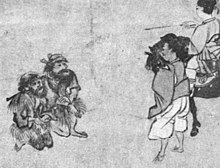Emishi
| Emishi | |
|---|---|
| Family name | |

Emishi paying homage to Prince Shotoku. Produced in 1324, based on Shotokutaishi e-den e-maki, made in 1069.
|
|
| Pronunciation | Emishi |
| Region of origin | Japan |
| Footnotes: from Namio, Egami, et al., Ainu to kodai Nippon. Japan: Shogakukan, 1982, p. 92. | |
The Emishi or Ebisu (?) constituted an ethnic group of people who lived in northeastern Honshū in the Tōhoku region which was referred to as michi no oku (道の奥?) in contemporary sources. The origin of the Emishi is unknown, but they are believed to have descended from the Jōmon people. The first mention of them in literature dates to AD 400, in which they are mentioned as "the hairy people" from the Chinese records. Some Emishi tribes resisted the rule of the Japanese Emperors during the late Nara and early Heian periods (7th–10th centuries AD). Scholars believe that they were natives of northern Honshū and were descendants of those who developed the Jōmon culture in that region. They are thought to have been related to the Ainu.
The Emishi were represented by different tribes, some of whom became allies of the Japanese (fushu, ifu) and others of whom remained hostile (iteki). The Emishi in northeastern Honshū relied on their horses in warfare. They developed a unique style of warfare in which horse archery and hit-and-run tactics proved very effective against the slower contemporary Japanese imperial army that mostly relied on heavy infantry. Their livelihood was based on hunting and gathering as well as on the cultivation of grains such as millet and barley. Recently, it has been thought that they practiced rice cultivation in areas where rice could be easily grown. The first major attempts to subjugate the Emishi in the 8th century were largely unsuccessful. The imperial armies, which were modeled after the mainland Chinese armies, were no match for the guerrilla tactics of the Emishi.
...
Wikipedia
